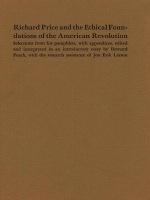3 books about 1723-1791

The Correspondence of Richard Price, Volume II
March 1778–February 1786
D. O. Thomas, ed.
Duke University Press, 1983
Perhaps best known as a political philosopher, Richard Price (1723–1791) made important contributions to British and American intellectual life in a variety of fields—philosophy, theology, mathematics, demography, probability and public finance, and private and social insurance. The second in a three-volume series edited by W. Bernard Peach and D. O. Thomas, The Correspondence of Richard Price makes available the extant copies of the correspondence to and from Price, including many published for the first time. These letters reveal Price's absorption with financial problems, his influence on the policies adopted by the British government, his defense of Newtonianism against Lord Monboddo, as well as important insights into the political and cultural life in Britain and America. Correspondents include John Adams, William Adams, J. D. van der Capellen, Benjamin Franklin, Thomas Jefferson, Henry Laurens, Lord Monboddo, William Pitt, Joseph Priestly, the Earl of Shelburne, Ezra Stiles, P. W. Wargentin, and Joseph Willard.
[more]

The Correspondence of Richard Price, Volume III
February 1786–February 1791
William Bernard Peach, editor
Duke University Press, 1983
This third and final volume in the series completes the known extant correspondence of Richard Price (1723-1791). Perhaps best known as a political philosopher, Price made significant contributions to Anglo-American intellectual life in the late eighteenth century in a variety of fields. This remarkable collection of letters, most previously unpublished, is impressive for the breadth of topics covered--religion, theology, politics, education, liberty, finance, demography, and insurance.
Price's correspondence with Adams, Franklin, Jefferson, Rush, and other Americans concern the issues of slavery, the rebellion in Massachusetts, use of paper money, opposition to the establishment of religion, and the status of the federal government. Letters to Priestly, Lansdowne, and others in Britain are about science and technology, the crisis in the United Provinces, armed neutrality, the national debt, revolution, religious sects, and foreign relations. In his correspondence with French leaders following the fall of the Bastille, particularly with le Duc del la Rochefoucauld, Price expresses his high hopes for the growth of civil and religious freedom in France.
Indispensable for an understanding of the work of one of the best known and most distinguished Welshmen of the eighteenth century, this book—and the series—will also be of interest to those who study the history of ideas.
Price's correspondence with Adams, Franklin, Jefferson, Rush, and other Americans concern the issues of slavery, the rebellion in Massachusetts, use of paper money, opposition to the establishment of religion, and the status of the federal government. Letters to Priestly, Lansdowne, and others in Britain are about science and technology, the crisis in the United Provinces, armed neutrality, the national debt, revolution, religious sects, and foreign relations. In his correspondence with French leaders following the fall of the Bastille, particularly with le Duc del la Rochefoucauld, Price expresses his high hopes for the growth of civil and religious freedom in France.
Indispensable for an understanding of the work of one of the best known and most distinguished Welshmen of the eighteenth century, this book—and the series—will also be of interest to those who study the history of ideas.
[more]

Richard Price and the Ethical Foundations of the American Revolution
William Bernard Peach, ed.
Duke University Press, 1979
Richard Price was a loyal, although dissenting, subject of Great Britain who thought the British treatment of their colonies as wrong, not only prudentially, financially, economically, militarily, and politically, but, above all, morally wrong. He expressed these views in his first pamphlet early in 1776. It concluded with a plea for the cessation of hostilities by Great Britain and reconciliation. Its analyses, arguments, and conclusions, however, along with its admiration for the colonists, their moral position and qualities, could hardly fail to contribute to their reluctant recognition that there was no real alternative to independence. Price found some of his views not only misunderstood but vilified by negative critics in the ensuing controversy. So he wrote a second pamphlet which was published in early 1777. He expanded his analysis of liberty, extended its application to the war with America, and greatly expanded his discussion of the economic impact upon Great Britain. After the war, in 1784, he published a third pamphlet on the importance of the American Revolution and the means of making it a benefit to the world, appending an extensive letter from the Frenchman, Turgot. Implicitly the letter regards Price as a perceptive theorist of the revolution; explicitly it identifies the problems facing the prospective new nation and expresses a wish that it will fulfill its role s the hope of the world. Selections in the appendices present a part of the pamphlet controversy and the selection of correspondence shows how seriously Price was regarded by Revolutionary leaders.
[more]
READERS
Browse our collection.
PUBLISHERS
See BiblioVault's publisher services.
STUDENT SERVICES
Files for college accessibility offices.
UChicago Accessibility Resources
home | accessibility | search | about | contact us
BiblioVault ® 2001 - 2024
The University of Chicago Press









